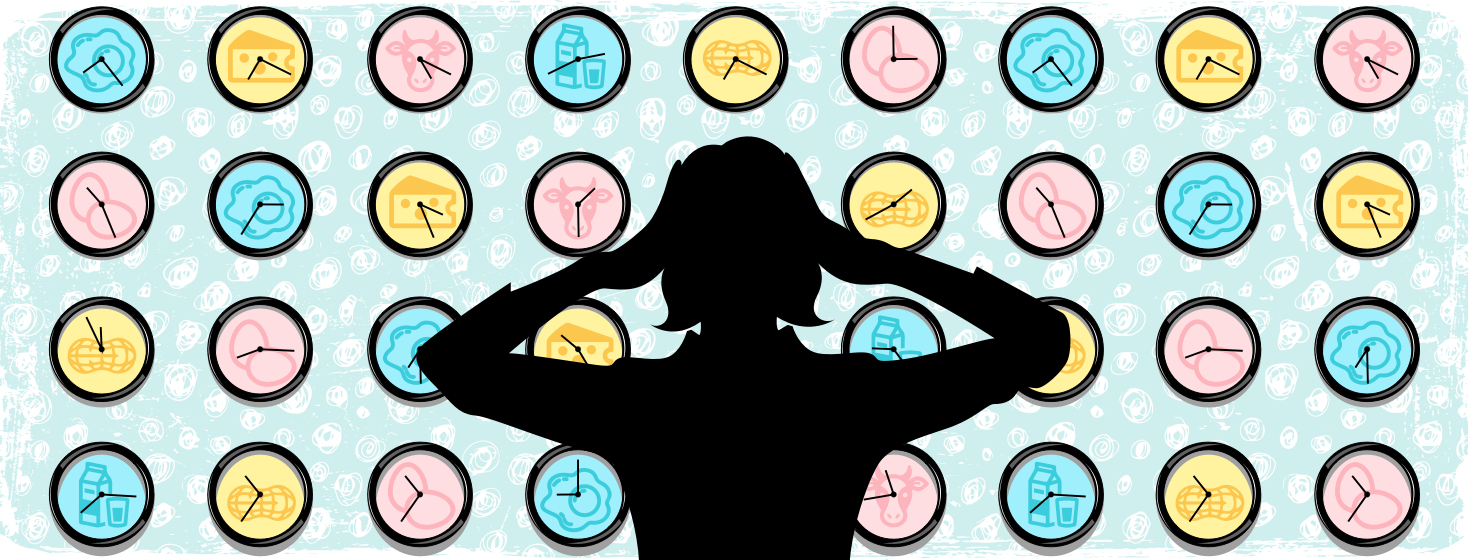Treating Baby's Allergies
I knew something was up with my little baby when she projectile vomited after drinking a bottle containing formula at only a month old. She didn't drink it very fast, even though it was definitely time for her to eat, as if she knew something wasn't right. After a few more months, and several attempts at various solid foods (including a pancake mix high in milk protein), it became clear she had allergies to cow's milk, eggs, and peanuts.
Seeing a pediatrician for baby allergies
I mentioned her reactions to the pediatrician who suggested for now that we avoid the foods we noticed gave her hives, and she prescribed an Epipen for emergencies, and a specific dosage of Benadryl for our baby's weight if she was having a more mild reaction. What she didn't recommend was an appointment with an allergist.
Avoiding allergens
Fast forward to a new pediatrician who suggested we wait for allergy testing until our baby was two years old. He explained that allergy tests aren't necessarily accurate until that age, but it turns out this is a common misconception among doctors. So, we removed dairy, eggs, and peanuts from our little one's diet, and waited.
Working around allergies
Right before her second birthday, I decided I was tired of waiting. I needed to know for sure if she was indeed allergic to these items, and what our next steps were going to be. It is a lot of work (as I'm sure many of you reading this know!) to check every label and make every meal with special, alternative ingredients.
Two of everything
I keep two different butters, two different milks, two different "nut" butters in the house, and frequently make two separate meals, to try to please my husband and five-year-old daughter, while still providing healthy, similar-looking alternatives for the youngest member of the family. I needed some sort of closure, and something to look forward to, as many moms had told me that their babies had grown out of these allergies as they grew up.
Allergy testing age
The allergist couldn't believe that the pediatrician hadn't suggested coming to see her right away. She told us that allergy skin testing can be done on babies as old as 6 months.1
Allergy symptoms
I explained how we noticed the allergy and what the symptoms were:
- Hives all over her body, generally appearing first where her diaper touched her belly, and then spreading
- Her eyes, eventually being sealed up
- The rashes/hives she would get even if she didn't eat the allergens, but her skin was exposed to them -like when we'd sit her in a semi-clean highchair at a restaurant
The test
We did a scratch test for the three suspected allergens on her little baby back, and all three came back positive. I wanted to do other tests to see if there were other things she was allergic to, but the tests were very expensive and basically paid out of pocket, so three tests were all we did.
Moving Forward
The allergist had several really important things to tell us as a way to move forward. Please be advised that this list was our "moving-forward" plan, and any allergist you see may have a different plan for you or your kiddos.
Allergies and baby eczema
She was getting hives even from the highchairs because her skin was covered in eczema, and allergens were getting into her body through the small cracks in her dried-out skin. So we needed to help heal her eczema, and then her rashes from simply contacting the allergens should stop.
Introducing baby to allergens
We could try feeding her eggs and cow's milk that had been cooked in the oven (350 degrees, for a minimum of 20 minutes). She suggested a cupcake recipe. If we fed her a tiny bit, waited 15 minutes and there was no reaction, we could try a little more, and wait some more, and keep doing this frequently to help her overcome these two allergies. There is mixed research on this approach (see this article from the National Institutes of Health); please do not attempt this unless your doctor suggests it.
Waiting to try the exposure method
The peanut allergy is here to stay for now…we can start trying to work on it once she turns four. I thought that maybe we could introduce peanuts in small amounts. I had read about pediatricians recommending this type of approach to people who suspected their child would be allergic to peanuts because of allergies that run in the family.2 But the allergist said that since she had a confirmed peanut allergy, it was too late to try this exposure method, and we'd have to wait.
Prescriptions
I was given a prescription for several steroid ointments, including triamcinolone and hydrocortisone, a new Epipen prescription, a folder with information for parents on how to take care of a child with allergies, and a renewed sense of hope.
Where are we now?
I am happy to report that she had no reaction to the cupcakes, her skin has cleared and she is able to happily sit in restaurants without breaking into a rash, and we've found lots of delicious non-dairy chocolate! She's a happy baby, now 2 and a half, and understands (at least a little) what she can and cannot have. Hopefully, she will grow out of all of these allergies like many other babies we know. Cross your fingers for us!

Join the conversation